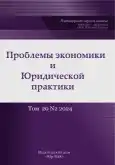Power and Influence as a Basic Human Need and the Basic Element of the Socio-Political Structure or why Realpolitik is Effective
- Autores: Chistoborodov I.G.1
-
Afiliações:
- Academy of Management of the Ministry of Internal Affairs of Russia
- Edição: Volume 20, Nº 2 (2024)
- Páginas: 38-45
- Seção: Public Law (State and Legal Sciences)
- URL: https://journals.eco-vector.com/2541-8025/article/view/633696
- EDN: https://elibrary.ru/CHZCUR
- ID: 633696
Citar
Texto integral
Resumo
Examining the developed pyramid of needs by Abraham Maslow, the author comes to the conclusion that the founder of humanistic psychology did not take into account one of the basic human needs—the acquisition of power and influence. It seems that after the fulfillment of physiological needs (satisfaction of hunger and thirst, as well as satisfaction of the need for sleep and rest), a person has a need for elevation within the social hierarchy. This phenomenon is understandable, since gaining power and influence allows one to ensure security at a higher level. In addition, having the opportunity to influence other members of society fulfills such needs as belonging to a social group, recognition and respect, creative fulfillment. It is obvious that power and influence also imply the realization of aesthetic needs and the need for self-actualization. Thus, the author comes to the conclusion that at the second level of the pyramid there should be a basic need—the acquisition of power and influence. Having presented the modified pyramid, the researcher proposes to look in a new way at socio-political trends: liberalism, solidarism and statism. Having analyzed the ideas of these socio-political trends, taking into account the «pyramid of needs» built by the author, it becomes clear why these inherently different concepts, based on basic questions of the origin of power and the administration of power, cannot be applied in their «pure form» as they are described in ideologemes. As a result of the study, the conclusion about the effectiveness of «Real Politics» (Realpolitik) in the form of a state political course free from the use of any ideology and principles of socio-political teachings is substantiated.
Texto integral
Sobre autores
Ilya Chistoborodov
Academy of Management of the Ministry of Internal Affairs of Russia
Autor responsável pela correspondência
Email: I.Chistoborodov@mail.ru
Código SPIN: 2147-8427
Dr. Sci. (Law)
Rússia, MoscowBibliografia
- Baburin S. N. Solidarism as a principle of a moral state. Implementation of the constitutional principle of economic, political and social solidarity: issues of theory and practice: Proceedings of the International Scientific and Practical Conference, Moscow, November 10–11, 2023. Moscow: Moscow University for the Humanities. 2023. pp. 9–15 (in Russian).
- Gubanenkova S. M. The doctrine of Eurasianism about statism—the most important component of Russian political culture. Scientific problems of humanitarian research. 2010. No. 9. pp. 195–200 (in Russian).
- Zolotarev S. P. Fundamentals of liberalism as an ideologeme of modern scientific methodology in social philosophy. Bulletin of Kalmyk University. 2019. no. 2(42). pp. 107–114 (in Russian).
- Zubov V.V. The German doctrine of «Realpolitik» through the prism of modern world politics. Humanities. Bulletin of the Financial University. 2022. vol. 12, No. 1. pp. 100–107 (in Russian).
- Klochkov V.V. Liberalism as the idea of freedom: European and Russian liberalism in historical comparison. News of TRTU. 2005. No. 6(50). pp. 200–206 (in Russian).
- Krutsko V. G. Abraham Maslow’s hierarchy of needs as an instrument of state social policy. Innovative approaches to solving modern problems in the social, humanitarian and economic spheres, Moscow, November 22–24, 2017 / Private institution educational organization of higher education Institute of Economics and Culture. M.: LLC Publishing House «Sputnik+», 2018. pp. 22–30 (in Russian).
- Nikolaeva L. S. Specifics of understanding human needs in the concept of A. Maslow. Bulletin of the Don State Agrarian University. 2015. No. 1-3(15). pp. 45–50 (in Russian).
- Okara A. N. Solidarism: The Forgotten Ideology of the 21st Century. Political Science. 2013. No. 4. pp. 146–155 (in Russian).
- Shabaga A. V. Methodology for the study of international relations: realism. Bulletin of the Russian Peoples' Friendship University. Series: International relations. 2015. vol. 15. No. 3. pp. 24–33 (in Russian).
Arquivos suplementares












